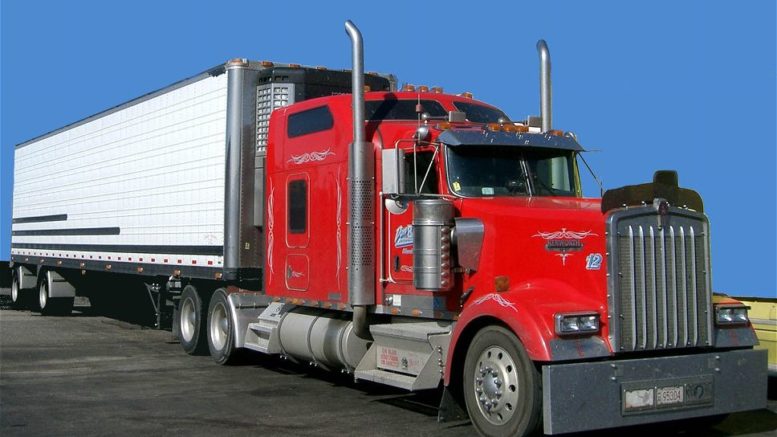Long-haul trucks are a big part of our economy. Now more than ever, trucking and distribution form the backbone of our e-commerce lifestyle. Yet, trucks are a big source of noise pollution, not to mention all the things they put into the atmosphere.
Editor’s note: Now, I could tell you that I’m writing this because we sell antennas for trucks and other large vehicles. I could tell you that it’s some attempt to appeal to our RV’ing audience. But, I’m not going to pretend. I’m writing this because at this very moment, a large and obnoxious diesel-powered truck is loitering outside our west-coast offices making a sound like a 45,000 pound swine. Sometimes on a blog you just go off topic. Care to come with me?
There are far worse blights on this world than diesel-powered vehicles. If you do own a truck or RV, you know that they’ve gotten a lot more environmentally friendly in the last decade. The fuel is cleaner and you’ve had to put on a lot of extra hardware to meet emissions regulations. That may have cost some extra money but I think it’s probably for the best long-term. However, no one has really addressed noise pollution.
Noise pollution is a real thing
Big engines are noisy. It’s not just Diesel engines, all big engines are noisy. Not only that, the kind of low-frequency noises they make are particularly hard for most people to take. If those noises are loud enough, they actually can start to shake buildings apart, too. When driving, the engine is obviously needed, but any visit to a truck stop will tell you that a lot of truckers run their engines when at rest too. They use them to run generators, air conditioning, and heating. That’s an expensive waste and it uses fuel and turns the entire truck stop into a rumbling mess of grunts and grumbles.
When big trucks come into residential neighborhoods, the result is especially obvious. Slow-moving trucks can be heard half a mile away. I’m talking about trash pickup, delivery trucks, that sort of thing. It’s a form of noise pollution that can be especially harmful to small children with their delicate ears.
The problem in the past has been that there simply hasn’t been an alternative. Whether gas or diesel-powered, those big trucks are incredibly important to the economy and to life in our cities and suburbs. We couldn’t live without them. They deliver everything from food to pencil sharpeners. They take away our trash and carry all those deliveries from the web sites we visit. We set reasonable guidelines, but we can’t live without them so we live with them.
It’s finally happening
Although electrically-powered vehicles have been around for over 120 years, it’s only been in the last five years that electric trucks have been viable. Companies like Tesla have developed fast charging systems that make it possible to charge a truck in under two hours and give it a full day of driving range. Some companies have sat up and taken notice: UPS has been running trials of electric delivery trucks for several years in Southern California and they’ve recently committed to electrifying a large part of their fleet. I’ve noticed the difference in our west coast HQ, too — Fedex trucks spend 10-15 minutes in this area and you can hear them the whole time. UPS trucks spend a similar amount of time and they’re silent when they’re not moving.
I know that distributors are beginning to get excited about the idea of the electric semi. Tesla is making huge strides in this area and they’ve attracted a lot of attention. For long-haul truckers, electric vehicles make huge sense. Most trucking companies will not let their drivers go more than a fixed distance, and the truck spends the rest of the time in a truck stop. Today, that truck spends most of its time idling, consuming fuel and making noise just so that its driver can have some comfort. Once truck stops start accommodating electric trucks, costs will go down for the driver. Noise, odors and particulates will disappear. Really this is a big win for everyone.
Let’s be honest — gas and diesel-powered vehicles are just more convenient. They probably always will be. You can refuel them in a few minutes. Even the fastest charge for electric vehicles takes over an hour. That’s a big transition for many people, but for long-haul truckers it doesn’t make any difference. A properly configured truck stop would let drivers park for the night, charging the vehicle slowly over 8 hours. This would spread out the load for the truck stop operator and make it easier to operate profitably.
Sound economic sense
The real reason to transition over to electric vehicles is that they are less expensive to operate, especially as fuel costs go up. The cost to generate the same amount of energy in at a power plant is much less than the cost of generating it using an engine. The fact that electric vehicles make no sound when they’re stopped, even if the heat or A/C is on, is an extra benefit that we should all applaud.
Electric trucks are better for drivers, too. Long-haul truckers can experience a level of comfort and ease with an electric truck that’s impossible with a diesel truck. Electrics should allow truckers to live healthier lives free of injuries from vibrations, noise and pollution. It’s a great deal for them too. And, with a practically endless supply of electricity for the cabin, they’ll be able to power wireless devices, satellite equipment, and televisions when they settle in for the night. It’s a win for Solid Signal that way, too.
I know I’ll love it when every delivery truck near our west coast offices arrives with a whisper instead of the mother of all grunts.





